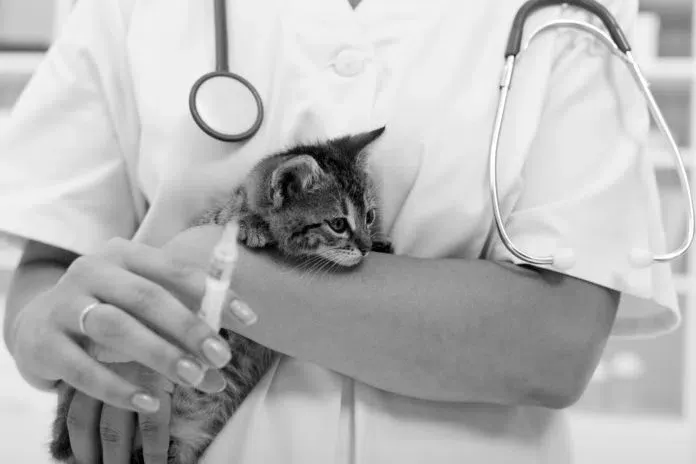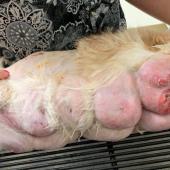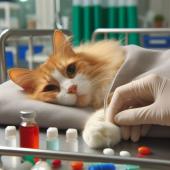Antibiotic resistant bacterial infections


Antibiotic resistant bacterial infections
MRSA (Meticillin Resistant Staphylococcus aureus) is a nasty bacterial infection that has been widely reported in the media. It has been in the news for the sometimes fatal infection of people and has been dubbed 'the superbug' and 'flesh eating bacteria'. MRSA can also occur in pets; however, pets more commonly can be infected with a different, although similar infection: MRSI (meticillin resistant Staphylococcus intermedius) or MRSP (meticillin resistant Staphylococcus pseudointermedius).

What is MRSA?
MRSA (Meticillin Resistant Staphylococcus aureus) is a bacterium that is resistant to the antibiotic meticillin (which is a type of penicillin). The earliest recorded MRSA was identified in humans in the UK in 1961. It was first reported to be a major problem in human hospitals in the USA in the 1970s, and in the 1990s it became recognised as an important cause of hospital associated infection in human hospitals all over the world. These hospital acquired strains of MRSA (HA-MRSA) cause the majority of human infections.
The skin is commonly home to huge numbers of bacteria that do not normally cause any problems. Staphylococcus is one of these bacteria. All people and animals carry Staphylococcus bacteria on their skin as part of their normal body flora, and as many as three in a hundred (3%) people carry the MRSA bacteria without realising or having any problems as a result. Figures also suggest that one in a hundred (1%) cats and between two and nine in a hundred (2-9%) dogs are carriers of MRSA in the UK. MRSA is spread by direct contact between infected people and animals. MRSA can be spread from people to animals and less frequently from animals back to people. It can also be picked up from contaminated objects in the environment such as towels, bedding and medical equipment.
Based on clinical cases observed, many experts believe companion animals are generally transient carriers of MRSA, which means they may only carry the bacteria for about 2-3 weeks before the bacterial population disappears. If you can avoid contact with your pet during this time and wash your hands regularly after touching them it should be possible to protect yourself against infection.
What is MRSP?
MRSP (meticillin resistant Staphylococcus pseudointermedius) is also a bacteria that is resistant to the antibiotic meticillin. Healthy animals can carry MRSP, and it is common on the skin and in the nose of healthy pets. MRSP infections in people are very rare and so spread of MRSP to pets is usually from direct contact with an infected animal.
Causes of Antibiotic Resistance in Cats
-
Overprescription and Misuse: Veterinarians sometimes prescribe antibiotics unnecessarily, or pet owners may misuse antibiotics by not completing the full course prescribed.
-
Inadequate Dosage: Administering incorrect dosages or stopping the medication prematurely can allow bacteria to survive and develop resistance.
-
Non-compliance: Cat owners might find it difficult to administer medications to their pets, leading to inconsistent antibiotic intake.
-
Antibiotics in Agriculture: Animals raised for food often receive antibiotics to promote growth, which can contribute to the development of antibiotic-resistant bacteria.
Consequences of Antibiotic Resistance in Cats
-
Increased Severity of Infections: Resistant bacteria can cause more severe and prolonged illnesses in cats, leading to complicated treatment and a higher risk of mortality.
-
Limited Treatment Options: As bacteria become resistant to commonly used antibiotics, veterinarians have fewer effective options for treating infections, making it challenging to manage diseases in cats.
-
Transmission to Humans: Resistant bacteria in cats can potentially spread to humans, posing a risk of zoonotic infections.
Are these infections dangerous?
For the host, having an MRSA or MRSP colony might not be problematic. If these bacteria manage to infect an animal that is already ill, has an open wound, or has a weakened immune system (due to illness or medication administration, such as chemotherapy), they are more likely to cause illness. MRSA infection in pets is not common in the UK.
It is recommended to separate a healthy pet from a household where one member has been found to be carrying an antibiotic-resistant infection until the pet has been cleared of the bacterium. Usually, this only takes time, although topical antibiotic treatments applied to the nose and baths in chlorhexidine shampoo can help with active decolonization, or the elimination of bacteria from the skin.
How can my pet catch one of these infections?
If the germs are found on a swab taken from your pet's skin, it does not necessarily mean the pet is infected. Antibiotic-resistant bacteria are frequently seen on the skin of animals that appear to be in good condition.These microorganisms can be obtained by direct contact with a sick people or animal, or through visiting a hospital or veterinary facility, where antibiotic-resistant bacteria are more common than in the "normal" environment. It has been noted that animals who live with individuals who are more likely to be exposed to MRSA, such as healthcare workers, veterinarians, and immunocompromised people, are more likely to contract antibiotic-resistant germs.
How would I know if my pet had MRSA or MRSP?
If you continue to be otherwise healthy, you might not be aware that you are carrying MRSA. People who are infected may exhibit skin symptoms including infections and spots, and more serious cases tend to appear in surgical wounds. It is impossible to diagnose a wound infection by visual inspection alone. Your veterinarian or physician will need to take a sample from an affected region and submit it to a lab for identification and culture in order to make a diagnosis.
Since skin is the most prevalent site for the presence of Staphylococcus germs, infections tend to arise there. Consider the likelihood of an antibiotic-resistant illness if your pet has a persistent skin infection (which can manifest as itching, pustules, boils, or ulcers) and if it does not improve with regular antibiotic treatment from your veterinarian.MRSA and MRSP infections can cause serious infections and sepsis, which can be fatal in pets, despite being quite uncommon.
What if my pet is diagnosed with MRSP?
There are no established techniques for eliminating the resistant bacteria from animals who are colonized with MRSP but do not exhibit overt clinical symptoms. You need to practice good hygiene and hand washing. It's important to pick up any excrement as soon as you see it and dispose of it before it infects other animals since it may contain the infection. You should wash your pet's bedding separately and, if at all feasible, dry it in a tumble dryer to disinfect it, even though MRSP does not fare well in the environment. However, there are specific situations in which pets can continue to harbor MRSP for extended periods of time.
Animals with skin infections, which are the most prevalent kind of infection, can be treated with different antibiotics, antibiotic cream applied topically, or a combination of both. Your animal's veterinarian will decide on the best course of action. Your veterinarian can provide you with advice on how to properly dispose of contaminated gloves and bandaging if you must handle infected wounds. Wear gloves whenever possible.
Can MRSP be treated?
Treatment for MRSA and MRSP infections can be more challenging than for other infections due to their resistance to several commonly used medications. The majority of MRSA and MRSP infections may, in fact, be effectively treated, despite how they are portrayed in the media. It is crucial to determine which medicines work best when treating germs that are resistant to them; to do this, your veterinarian will need to collect swabs and maybe consult with infectious disease or medication experts. Additionally, maintaining proper hygiene is crucial. For example, cleaning and cleansing the wound can assist because these bacteria prefer unclean, enclosed spaces with low oxygen levels.
Can MRSA and MRSP be prevented?
Bacterial strains that undergo mutations and develop resistance to particular antibiotics are known as antibiotic-resistant bacteria. Antibiotics may also eradicate the body's natural flora, giving resistant germs an opportunity to proliferate.
Furthermore, overusing antibiotics—for example, by taking them for unrelated ailments and skipping recommended courses of treatment—may contribute to the development of antibiotic resistance. There are a lot of things that the veterinary field can learn from the developments in human medicine.
It is critical that we safeguard the antibiotics we currently have and make sure they continue to be effective for us down the road. If your pet is prescribed antibiotics, make sure you strictly adhere to your veterinarian's instructions and administer the entire course of medication—even if your pet appears to be getting better.
Preventive Measures
-
Proper Veterinary Consultation: Always consult a veterinarian before administering antibiotics to your cat. Avoid self-diagnosis and self-medication.
-
Complete the Full Course: Finish the entire prescribed antibiotic course, even if your cat appears to be recovering. Stopping the medication prematurely can contribute to antibiotic resistance.
-
Avoid Antibiotic Overuse: Do not pressure your veterinarian for antibiotics if they believe they are unnecessary. Trust their judgment and expertise.
-
Good Hygiene: Practice good hygiene around your cat, keeping their living area clean and ensuring proper disposal of waste to minimize the risk of infections.
-
Support Research: Support research into developing new antibiotics and alternative treatments for bacterial infections, encouraging the medical community to stay ahead of antibiotic-resistant bacteria.
Conclusion
Antibiotic resistance poses a significant threat to both feline and human health. Responsible pet ownership, including appropriate antibiotic use, is essential in preventing the further spread of antibiotic-resistant bacteria. By working together with veterinarians, adhering to prescribed treatments, and promoting awareness about antibiotic resistance, cat owners can contribute to preserving the effectiveness of antibiotics and ensuring the health and well-being of their feline companions for generations to come.






